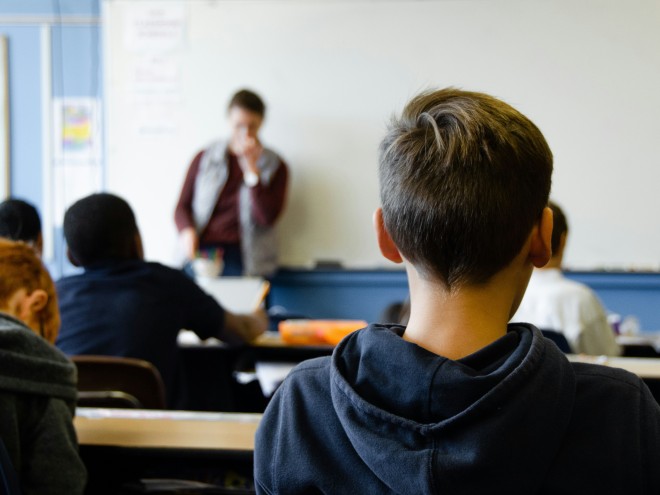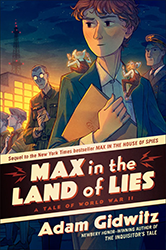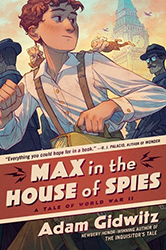“Given the subject matter of Adam’s book, the recent events in the world and a few things going on at my school, my principal thinks it’s best to cancel.”
I received this email a couple of months ago, regarding a visit that I had planned to an elementary school.
I was stunned. I am still stunned.
The subject matter of my newest book, Max in the House of Spies, is not current events, scary fairy tales (a specialty of mine), or anything I expected to be controversial. It’s about the Kindertransport, the effort to get Jewish children out of Nazi Germany in 1938 and 1939.
The school that canceled my visit is not located in a state known for book banning nor in a county known for antisemitism. Rather, it is located in the city with three times as many Jewish people as any other city in the world, on the Upper East Side of Manhattan, blocks from many major synagogues and Jewish organizations.
The recent events in the world were not specified, but this past December all anyone could talk about was Taylor Swift and Travis Kelce, so I can only assume that’s what the school was concerned about. Which is why I’m so stunned. What does Swelce…
Oh. Ohhhh. THOSE world events.
Well now I’m even MORE stunned.
I never got more of an explanation. I don’t know what the “few things going on” at the school were. But I’m sure you’re all guessing right now.
It seems to me — and you now have as much information as I do, so your guess may be better than mine — that the war in Gaza was causing heated conversations in this school, especially among the parent body, and my visit was seen as a potential exacerbation of those “things going on.”
Because I was going to talk about a spy novel? That begins with the Kindertransport, the effort to get Jewish children out of Nazi Germany?
The conversation around the war in Gaza had become so toxic that a Jewish author who has expressed next to nothing publicly about Gaza and Israel – except the most vague and hapless social media post about the children of Israel and Gaza living in peace and safety – couldn’t be trusted to talk about Jewish children fleeing to safety eighty-five years ago?
This is the sad state of affairs we live in today. Where everyone is so angry, so hurt, so afraid that someone else will say something that will make them angry or hurt, that all we seem to do is shout our own opinion or tell other people to shut up about theirs. Even people who had never had any intention of expressing an opinion.
But we are not unique. Not so long ago, I visited a school in a place where tensions run even higher, and the enmity between the sides is even more barbed.
In May of 2023, I was blessed to visit the Jerusalem campus of Hand in Hand. Hand in Hand runs a network in Israel of integrated schools, where Jewish and Arab children study together. This is not the norm in Israel — there are actually different tracks in public schools: Arab; Jewish ultra-Orthodox; religious; and secular.
I know very little about the Israeli education system, and I can’t say whether these tracks are all equally good. What I do know is that it isn’t easy to run an integrated school in West Jerusalem. Funding is low and enrollment is sometimes a challenge. In 2014, vandals broke into the library and trashed it, scrawling hateful slurs about Arabs on the walls.
And yet, the children’s projects we saw hanging in the hallways were a gorgeous portrait of people living together and striving to understand each other. A central concept at the school is “resilient listening.” Which means sitting in a group and hearing things that may be very hurtful to you — not intentionally, but because they are someone else’s truth — and really hearing it, resiliently, even though it may hurt. So when an Arab child refers to the founding of Israel as the Nakba, the catastrophe, and says her grandparents lost their home and now she can’t see her cousins — a Jewish child listens and hears that. And when a Jewish child says that after the Oslo accords could have brought peace but instead brought the intifada and their uncle was blown up on a bus — an Arab child listens and hears that, too.
I came back from Hand in Hand thinking a lot about resilient listening. Then October 7th happened, and three weeks later Israeli forces entered Gaza. Suddenly I started thinking about resilient listening a lot more.
Most schools have much more resilience than that one on the Upper East Side. I’ve visited nearly two dozen schools in the last five weeks to promote Max in the House of Spies and no one else has canceled. Nor has Israel or Gaza come up.
Actually, they did — once.
I was at a school in Washington DC that has a Jewish affinity group for students, and they were invited to meet with me after my presentation to the entire middle school. This is standard practice at this school — after a visiting speaker’s talk, the affinity group or groups they identify with are invited to meet with them if the speaker is willing. I was.
The Jewish group that assembled before me was large — thirty or forty kids, I’d estimate — and eager. I opened by saying that this was a tough time for Jewish people. There was October 7th, and then the invasion of Gaza, and it seems like everyone is mad at everyone and almost everyone is mad at Jews. Even Jews who have nothing to do with the conflict. I just wanted to say that aloud for the kids, but then I said that I was happy to talk about anything — how my Jewish education affected me, more about the Kindertransport, my books. Didn’t have to be about Jewish stuff.
A seventh grade girl raised her hand instantly. I called on her. She said, “My mother worked in Gaza for a few years… Can you explain what’s happening there?”
I’ll be honest, I was just as stunned as I’d been when I got the email from the school on the Upper East Side. I thought she had told me about her mother’s work in Gaza to establish her bona fides, before launching into an opinion. No, she was just telling me. And despite her mother’s relative expertise on the subject (relative at least to mine, which is none), this girl just wanted me to “explain what’s happening there.”
The earnestness of her desire for basic facts makes me want to cry as I write this. Why did she feel the need to ask me? I wrote a book about Jewish children eighty-five years ago. Why me?
I’ll tell you why. Because I had presented myself that day as an adult who cared about these kids, and who had let them have a freewheeling discussion of justice and love (during my full group presentation), and because as they had that discussion I listened. So I tried to explain the conflict as fairly and clearly as I could, with a maximum amount of empathy.
And then a boy raised his hand and said, “Can you explain what’s going on on college campuses right now?”
I mean, come on people. Our children just desperately want to know what’s happening in this farkakte world. In a clear and fair and empathic way.
They’re listening to us. Or they want to. Not to us shouting, but to us calmly trying to explain what’s happening, showing empathy for all innocent people, and most importantly empathy for the kids — the kids over there and the kids who are here, listening. Resiliently. Waiting for us grown ups to stop shouting and telling each other to shut up.
Maybe, hopefully soon, we’ll start listening to the kids.
Bestselling author Adam Gidwitz was a teacher for eight years. He told countless stories to his students, who then demanded he write his first book, A Tale Dark & Grimm. Adam has since written two companion novels, In a Glass Grimmly and The Grimm Conclusion. He is also the author of The Inquisitor’s Tale, which won the Newbery Honor, and The Unicorn Rescue Society series. Adam still tells creepy, funny fairy tales live to kids on his podcast Grimm, Grimmer, Grimmest—and at schools around the world. He lives in Brooklyn with his wife, daughter, and dog, Lucy Goosey.




